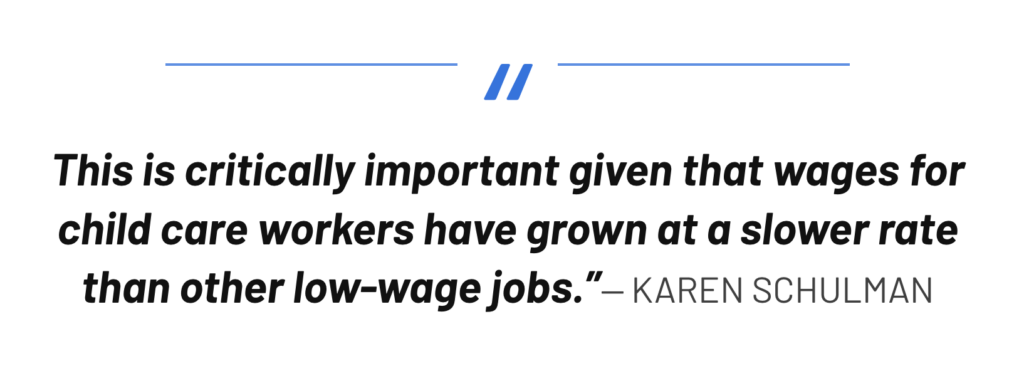
South Carolina’s child care sector stands to lose $900 million in federal funding | Credit: Gettyimages.com
South Carolina parents struggling to secure adequate child care may face additional hardship soon as billions of dollars of federal stabilization funding is poised to expire Sept. 30, experts say. The potential loss to the Palmetto State is staggering — up to almost $900 million a year.
“When parents don’t have child care, it impacts the kids, their families, employers and the greater community,” said Bett Williams, chief communications officer of Columbia nonprofit Children’s Trust of South Carolina. “We look forward to working with the state’s leadership on developing workable, sustainable solutions to this complex problem.”
In response to the Covid-19 pandemic crisis, the American Rescue Plan Act (ARPA) provided nearly $40 billion in child care funds to states which allocated $15 billion in supplement funding to the existing federal Child Care and Development Block Grant (CCDBG) program, according to Karen Schulman, director of state child care policy for the National Women’s Law Center in Washington, D.C.
South Carolina was allocated $183 million in federal CCDBG funding in 2023, she said. In addition, ARPA provided South Carolina with $273 million in supplemental CCDBG funding and $437 million in child care stabilization grant funding.
“Federal funding is crucial for supporting South Carolina’s child care system,” Schulman told the Charleston City Paper.
What’s at risk
The Law Center refers to a recent report published by The Century Foundation nonprofit, which found that 49,335 South Carolina kids soon are set to lose child care and 618 child care programs in the state are expected to close. The report analyzed state-level data on the number of child care centers and family care providers receiving child care stabilization grant funding and the number of children reached through the funding.
The National Women’s Law Center is making efforts to ask Congress to pass an additional $16 billion in emergency relief funding that would allocate additional funds to South Carolina. The Law Center also encourages parents to contact their congressional delegation and urge them to pass the additional emergency relief funding, she said.
“It stands to reason that without this additional funding, South Carolina is likely to scale back access to child care assistance,” Schulman said.
Devastation may be ahead
The loss of the federal stabilization grant dollars, which expire on Sept. 30, will be devastating for the child care industry as a whole, Schulman said.
“Families and children will bear the brunt of the harm if Congress fails to provide the [additional] $16 billion that is necessary to help states stave off the looming child care crisis,” she said.
Federal stabilization funding allowed South Carolina to raise payment rates for child care programs, which in turn likely helped programs maintain or increase wages for child care workers, she said.

“This is critically important given that wages for child care workers have grown at a slower rate than other low-wage jobs.”
If child care programs are no longer receiving federal stabilization grants, she said, programs may need to compensate for that lost income by raising parents’ fees or reducing staffing — and some may even be forced to close. Another possible effect is an increased child-to-teacher ratio that could mean less one-on-one attention.
“We encourage families to talk with directors and teachers at their child care programs about any potential impacts of the loss of the federal funding,” Schulman said.
Williams cited a national statistic that could suggest South Carolina parents were already grappling with inadequate access to affordable child care even before this potential loss of stabilization funding.
Almost 15% of South Carolina parents reported having to quit, change or refuse a job due to child care problems, she said, citing a 2021 National Survey of Children’s Health from the United States Census Bureau.
Options for financial aid
Families can try contacting the South Carolina Child Care Resource and Referral agency or the Trident United Way to see if they are eligible for options for federal, state, local or private programs that offer assistance with child care costs.
The South Carolina Department of Social Services (SCDSS) offers child care scholarships for working parents, said SCDSS Public Information Coordinator Danielle Jones. No current scholarship recipients will be affected by the potential change in federal stabilization funding.
Source: Charleston City Paper



